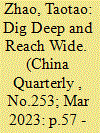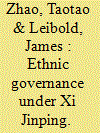|
|
|
Sort Order |
|
|
|
Items / Page
|
|
|
|
|
|
|
| Srl | Item |
| 1 |
ID:
181917


|
|
|
|
|
| Summary/Abstract |
The cadre system in China is designed to reduce human error as well as improve government efficiency and competence. Focusing on the Tibetan Autonomous Region (TAR), this research analyses the particularities of the cadre system in China’s ethnic minority regions and their impact on local governance. It argues that peculiarities in the recruitment, evaluation, term of office and ethnic minority cadre arrangements have actively and passively encouraged controversial cadre behaviours at the local level. Together with the historical, political and demographic conditions in the TAR, the cadre system has, at times, decreased the efficiency, competence and credibility of local governments. Although changes have been introduced in recent years to address some of the issues, the cadre system’s impact on local governance remains fundamental.
|
|
|
|
|
|
|
|
|
|
|
|
|
|
|
|
| 2 |
ID:
190405


|
|
|
|
|
| Summary/Abstract |
Since the early 2010s, a low-profile “dig deep and reach wide” campaign led by local Chinese Communist Party (CCP) committees has unprecedently institutionalized and embedded academic opinions into the regimes’ decision-making processes. This research aims to deepen the existing understanding of the intricate relationship between players in the CCP's decision-making process by analysing the Party's deliberation on scholarly opinions through an academic lens. It argues that the local Party committees’ incentives to incorporate academic opinions into their information channels are not only a reaction to the central CCP's increasing need to “reach wide” for high-quality and critical policy proposals but are also a move to seek political endorsement from the central authorities. This process has transformed government–academic relations in China from a patron-client model to one of increasing interdependence in which Chinese academia has become increasingly attuned to the thinking and needs of the CCP.
|
|
|
|
|
|
|
|
|
|
|
|
|
|
|
|
| 3 |
ID:
172245


|
|
|
|
|
| Summary/Abstract |
The motto ‘the Party rules everything’ is now a defining characteristic of governance in Xi Jinping’s ‘New Era’. This article analyzes the changing Party-state relationship by interrogating the competition between the Chinese Communist Party’s United Front Work Department and the State Council’s Ethnic Affairs Commission from the early 2000s, focusing particularly on the changes since Xi became leader in 2012. Through discourse analysis, the article documents the gradual yet significant shift in authority from the state to the Party in the institutional structures and ideological praxis of ethnic governance. It argues that the emerging power of the United Front Work Department over ethnic theory, policy and implementation signifies an important shift in ethnic governance through the intensification of integrationist solutions to China’s age-old ‘ethnic question’.
|
|
|
|
|
|
|
|
|
|
|
|
|
|
|
|
| 4 |
ID:
178890


|
|
|
|
|
| Summary/Abstract |
Between 2009 and 2014, against the background of the Xinjiang ethnic unity education textbook reform (2009–2010), vigorous academic debate on China's ethnic policy reform took place. Two academic cliques – one championing reform and the other representing the status quo – gradually came to the fore in this debate and competed to influence policy. This research seeks to unpack the mechanisms in China's knowledge regime that allow one agent (such as a think tank or academic) to prevail over others. Agents have an impact on policymaking mainly through connections with the decision-making body. This research uses three variables (ideological connection, level and nature of the connection) to analyse the relative policy influence of different agents in the debate. This research is among the first to provide an in-depth analysis of the debate's policy impact at the local level. The reform clique prevailed in this case because of its ability to bond with and influence higher-level decision-making bodies. Beginning in 2014, the Chinese Communist Party officially adopted the reform clique's language because of its alignment with the Party's growing need to maintain security in ethnic minority areas. Furthermore, key reform clique players continue to have an impact on the national policy shift.
|
|
|
|
|
|
|
|
|
|
|
|
|
|
|
|
| 5 |
ID:
192134


|
|
|
|
|
| Summary/Abstract |
Contrary to the arguments in most of the literature, the central government of China applies diversified rather than homogenous measures to govern its Ethnic Tibetan Autonomous Areas (ETAA). Applying the analytical framework of ‘inner and outer peripheries’, this research argues that the central government has favoured the Tibetan Autonomous Region (TAR), particularly in state fiscal assistance, over the other ETAAs, due to its unique governance challenge. This research analyses the central government’s fiscal assistance to the ETAAs from 2010 to 2019 and reveals an increasing fiscal gap between them. Not only has the TAR been consistently in the lead but fiscal inequality has also grown among ETAAs in the provinces of Sichuan, Yunnan, Qinghai and Gansu. Fieldwork in the TAR, Yunnan, Gansu and Sichuan reveals that the fiscal gap, combined with varied local circumstances, has created multifaceted social and economic unevenness in the ETAAs.
|
|
|
|
|
|
|
|
|
|
|
|
|
|
|
|
|
|
|
|
|